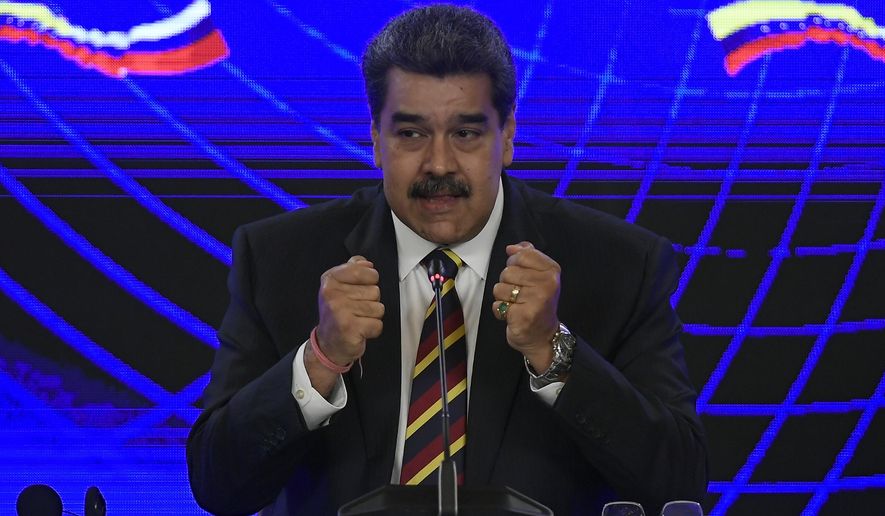CARACAS, Venezuela (AP) — Venezuela President Nicolás Maduro signaled an interest in improving relations with the U.S. following weekend talks with high-level American officials prompted in part by Russia’s invasion of Ukraine and concerns of rising gas prices in the U.S.
Maduro, in a televised meeting with cabinet members late Monday, did not provide details of the discussions. Neither did a White House spokeswoman earlier.
But he seemed to indicate he was willing to accede to U.S. demands that he resume negotiations with his opponents as a first building block for any relief from U.S. sanctions that have been punishing the OPEC nation for years.
“We have agreed to work on an agenda going forward, issues of interest,” Maduro said. “It seemed to me very important to be able, face to face, discuss issues of maximum interest to Venezuela and the world. And I ratify, as I said to the delegation, all our will to advance in an agenda of well-being and peace through diplomacy, respect and the highest hope for a better world.”
The discussions come a little more than three years after the U.S. broke off relations with Maduro and recognized opposition leader Juan Guaidó as the country’s legitimate leader. They came together after months of quiet backchannel talks by intermediaries - American lobbyists, Norwegian diplomats and international oil executives - who have been pushing for U.S. President Joe Biden to revisit the so-far-unsuccessful “maximum pressure” campaign to unseat Maduro that he inherited from the Trump administration.
But the impetus for a risky outreach to Maduro - who has been sanctioned and is indicted in New York on drug trafficking charges - took on added urgency following Russia’s invasion of Ukraine and ensuing U.S. sanctions there, which promises to reshuffle global alliances and add to rising gas prices driving inflation already at a four-decade high.
Powerful Democrats and Republicans alike on Capitol Hill last week began voicing support for a U.S. ban on Russian oil and natural gas imports as the next step to punish Russia President Vladimir Putin for the invasion.
Venezuela is Putin’s top ally in Latin America and a top oil exporter. Its reentry into U.S. energy markets could mitigate the fallout at the pump from a possible oil embargo on Russia. But the discussions in Caracas were quickly condemned by top Democrat and Republic senators.
U.S. Sen. Bob Menendez, chairman of the Senate Foreign Relations Committee, said Biden’s efforts to unite the world against Putin “should not be undercut by propping up” Maduro, whose government is under investigation by the International Criminal Court for possible crimes against humanity committed against protesters in 2017.
“If the reports are true that the Biden administration is brokering the purchase of Venezuelan oil, I fear that it risks perpetuating a humanitarian crisis that has destabilized Latin America and the Caribbean for an entire generation,” the Democrat said in a statement. “… As such, I would strongly oppose any action that fills the pockets of regime oligarchs with oil profits while Maduro continues to deprive Venezuelans of basic human rights, freedoms, and even food.”
Republican U.S. Sen. Marco Rubio, one of the architects of the regime change policy, also criticized the discussions, tweeting that they represent a “demoralizing betrayal of those who have risked everything to oppose Maduro.”
Venezuela has been going through a deep political, social and economic crisis for years, which critics attribute to a drop in oil production from rampant mismanagement by socialist governments. The government largely blames U.S. economic sanctions.
Millions of people have fallen into poverty, pushing many to migrate. The United Nations has estimated that more than 6 million Venezuelans have left the country in recent years, more than 10% of the population.
Maduro broke off dialogue with his opponents last fall after one of his key allies was extradited from Cape Verde to the U.S. on money-laundering charges.
The U.S.-backed faction of the opposition did not immediately comment on the remarks by Maduro, who also called on reformatting the dialogue that had taken place in Mexico under the guidance of Norwegian diplomats.
“We have decided in this meeting to reactivate with great strength the process of national dialogue with all the political, social, economic, religious and cultural factors of the country,” Maduro said. “… If we are asking for dialogue for the world, we have to set an example in the country.”




Please read our comment policy before commenting.